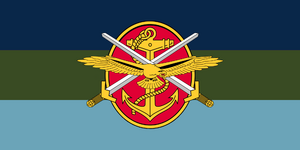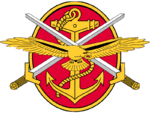Meridon Defense Forces: Difference between revisions
(Created page with "{{Infobox national military |country = {{flag|Meridon}} |name = Meridon Defense Forces |native_name = |image = File:MDF_triser...") |
|||
| Line 83: | Line 83: | ||
{{ | {{Template:Meridon topics}} | ||
{{MeridonDefenseForce}} | {{MeridonDefenseForce}} | ||
[[Category:Meridon]] | [[Category:Meridon]] | ||
[[Category:Meridonian military]] | [[Category:Meridonian military]] | ||
Revision as of 16:07, 18 December 2022
| Meridon Defense Forces | |
|---|---|
 Triservice flag of the Meridon Defense Forces | |
 Emblem of the Meridon Defense Forces | |
| Founded | 06 May 1739 |
| Service branches | |
| Leadership | |
| President | William Acton |
| Defense Secretary | Jason Meritt |
| Chief of Defense Staff | John Argus |
| Personnel | |
| Active personnel | 168,000 |
| Reserve personnel | 50,000 |
| Expenditure | |
| Budget | 51 billion |
| Percent of GDP | 3.4% |
| Industry | |
| Domestic suppliers | List
|
| Related articles | |
| History | Military history of Meridon List of wars involving Meridon |
| Ranks | Army ranks and insignia Navy ranks and insignia Air Forces ranks and insignia |
The Meridon Defense Forces are the military services of Meridon.
The Commander-in-Chief of the Armed Forces is the President of Meridon, while the seniormost ranking officer is known as the Chief of Defense Staff. The Armed Forces are divided into three services; the Meridonian Army, the Meridonian Navy, and the Meridonian Air Forces.
As of 2020, the Meridon Defense Forces number around 168,000 active troops and 50,000 reserve personnel, which are all part time and professionally trained members of the Defense Force. Conscription into the Defense Forces was mandatory for all males aged 18-28 from 1934-1960, but the force has been able to sustain enough volunteer personnel to maintain its strength. The President, with consent of the Senate, reserves the right to enact conscription as needed.
History
See also: Military history of Meridon
Structure
Branches
Army
Main article: Meridonian Army
The Meridonian Army is the land warfare component of the Meridon Defense Forces. It is composed of 106,482 active duty troops, and about 50,000 reservists as of 2022, and is the largest service branch in the Meridon Defense Forces. It is a highly developed and modernized force organized around high levels of mobility and expeditionary capability, including rapid deployment both domestically and regionally.
Main article: Meridonian Navy
The Meridonian Navy is the naval warfare component of the Meridon Defense Forces. It is composed of 41,328 active duty sailors, and about 14,000 reservists as of 2022. It operates a number of aircraft and a number of naval vessels, making it the number largest navy in the world. It is a blue water navy and operates aircraft carriers, submarines, amphibious warships, and other support vessels. The Navy also contains the Regiment Marines Commando, which is the elite amphibious warfare group of the Meridon Defense Forces.
Air Forces
Main article: Meridonian Air Forces
The Meridonian Air Forces is the aerial warfare component of the Meridon Defense Forces. It is composed of 34,619 active duty airmen, and about 10,000 reservists as of 2022. It operates a number of aircraft, making it the number largest airforce in the world. It is a multi-spectrum airforce with large transport capabilities and a sizable combat air force.
Military Areas of Responsibilities
Personnel
Budget
Procurement
Weapons of Mass Destruction
Meridon is not known to have or possess nuclear weaponry, however it is assumed that Meridon has the capability to produce them at will as it operates nuclear-powered vessels and nuclear power plants independently, and has done so since at least 1972. Meridon has never carried out tests of nuclear weaponry. In 2014, the Senate passed a non-binding resolution declaring that Meridon has no intent to procure nuclear weaponry, however it was not signed by the sitting President.
Meridon is known to have used chemical weaponry in its past, but has since destroyed all stocks of its chemical and nerve agent weaponry, having been verified by international inspectors in 1988. Meridon maintains a small chemical weapons research program that is primarily utilized for research for force protection.
Meridon has never utilized biological weaponry, but similarly to its chemical weapons program, it maintains a small program that assists in researching defense and prevention of biological weaponry.